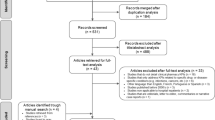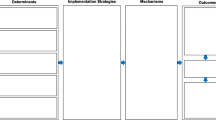Abstract
The development of health interventions is receiving increasing attention within the scientific literature. In the past, interventions were often based on the ISLAGIATT principle: that is, ‘It seemed like a good idea at the time’. However, such interventions were frequently ineffective because they were either delivered in part or not at all, demonstrating a lack of fidelity, or because little attention had been paid to their development, content, and mode of delivery. This commentary seeks to highlight the latest methodological advances in the field of intervention development, drawing on health psychology literature, together with guidance from key organisations and research consortia which are setting standards for development and reporting. Those working within pharmacy practice research can learn from the more systematic approach being advocated, and apply these methods to help generate evidence to support new services and professional roles.

Similar content being viewed by others
References
Godlee F. We need to put the evidence to work. BMJ. 2009;339:b5236.
Michie S, Fixsen D, Grimshaw JM, Eccles MP. Specifying and reporting complex behaviour change interventions: the need for a scientific method. Implement Sci. 2009;4:40.
Bernsten C, Bjorkman I, Caramona M, Crealey G, Frokjaer B, Grundberger E, et al. Improving the well-being of elderly patients via community pharmacy based provision of pharmaceutical care. Drugs Aging. 2001;18:63–77.
Patterson SM, Hughes CM, Crealey G, Cardwell C, Lapane K. An evaluation of an adapted United States model of pharmaceutical care to improve psychoactive prescribing for nursing home residents in Northern Ireland (Fleetwood NI Study). J Am Geriatr Soc. 2010;58:44–53.
Wazaify M, Hughes CM, McElnay JC. The implementation of a harm minimization model for the identification and treatment of over-the-counter drug misuse and abuse in community pharmacies in Northern Ireland. Patient Educ Couns. 2006;64:136–41.
Michie S, Atkins L, West R. The behaviour change wheel: a guide to designing interventions. 1st ed. London: Silverback Publishing; 2014.
Page MJ, French SD, McKenzie JE, O’Connor DA, Green SE. Recruitment difficulties in a primary care cluster randomised trial: investigating factors contributing to general practitioners’ recruitment of patients. BMC Med Res Method. 2011;11:35.
Peters-Klimm F, Campbell S, Muller-Tasch T, Schellberg D, Gelbrich G, Herzog W, et al. Primary care-based multifaceted, interdisciplinary medical educational intervention for patients with systolic heart failure: lessons learned from a cluster randomised controlled trial. Trials. 2009;10:68.
Medical Research Council. A framework for the development and evaluation of RCTs for complex interventions to improve health, 2000.
Medical Research Council. Developing and evaluating complex interventions: new guidance, 2008.
Michie SM, Johnston C, Abraham R, Lawton D, Parker D, Walker A. Making psychological theory useful for implementing evidence based practice: a consensus approach. Qual Saf Health Care. 2005;14:26–33.
Improved Clinical Effectiveness through Behavioural Research Group (ICEBeRG). Designing theoretically-informed implementation interventions. Implement Sci. 2006;1:4.
Grol R, Bosch MC, Hulscher MEJL, Eccles MP, Wensin M. Planning and studying improvement in patient care: the use of theoretical perspectives. Milbank Q. 2007;85:93–138.
Michie S, West R, Campbell R, Brown J, Gaisforth H. ABC of behaviour change theories. 1st ed. London: Silverback Publishing; 2014.
Cane J, O’Connor D, Michie S. Validation of the theoretical domains framework for use in behaviour change and implementation research. Implement Sci. 2012;7:37.
Francis JJ, O’Connor D, Curran J. Theories of behaviour change synthesised into a set of theoretical groupings: introducing a thematic series on the theoretical domains framework. Implement Sci. 2012;7:35.
French SD, Green SE, O’Connor DA, McKenzie JE, Francis JJ, et al. Developing theory-informed behaviour change interventions to implement evidence into practice: a systematic approach suing the theoretical domains framework. Implement Sci. 2012;7:38.
Michie S, Richardson M, Johnston M, Abraham C, Francis J, Hardeman W, et al. The behavior change technique taxonomy (v1) of 93 hierarchically clustered techniques: building an international consensus for the reporting of behaviour change interventions. Ann Behav Med. 2013;46:81–95.
Michie S, Johnston M, Francis J, Hardeman W, Eccles M. From theory to intervention: mapping theoretically derived behavioural determinants to behavior change techniques. Appl Psychol. 2008;57:660–80.
Cane J, Richardson M, Johnston M, Ladha R, Michie S. From lists of behaviour change techniques (BCTs) to structured hierarchies: comparison of two methods of developing a hierarchies of BCTs. Br J Health Psychol. 2015;20:130–50.
French SD, McKenzie JE, O’Connor DA, Grimshaw JM, Mortimer D, Francis JJ, et al. Evaluation of a theory-informed implementation intervention for the management of acute lower back pain in general medical practice: the implement cluster randomised trial. PLoS ONE. 2013;8:e65471.
Cadogan CA, Ryan C, Gormley GJ, Passmore P, Francis J, Kerse N, et al. Prescribing appropriate polypharmacy for older people in primary care: a qualitative study of general practitioners’ perceptions and experiences. Int J Pharm Pract. 2015;23:9–10.
Oxman AD, Fretheim A, Flottorp S. The OFF theory of research utilization. J Clin Epidemiol. 2005;58:113–6.
Bhattacharyya O, Reeves S, Garfinkel S, Zwarenstein M. Designing theoretically-informed implementation interventions: fine in theory, but evidence of effectiveness in practice is needed. Implement Sci. 2006;1:5.
Schultz K, Altman D, Moher D, CONSORT Group. CONSORT. Statement: updated guidelines for reporting parallel group randomised trials. BMJ. 2010;340:c332.
Hoffmann TC, Glasziou PP, Boutron I, Milne R, Perera R, Moher D, et al. Better reporting of interventions: template for intervention description and replication (TIDieR) checklist and guide. BMJ. 2014;348:g1687.
Workgroup for Intervention Development and Evaluation Reporting (WIDER). Improving reporting of behavioural interventions: WIDER consensus statement, 2009. http://interventiondesign.co.uk/wp-content/uploads/2009/02/wider-recommendations.pdf.
Albrecht L, Archibald M, Arseneau D, Scott SD. Development of a checklist to assess the quality of reporting of knowledge translation interventions using the Workgroup for Intervention Development and Evaluation Research (WIDER) recommendations. Implement Sci. 2013;8:52.
Acknowledgments
CA Cadogan is currently being supported by a project grant from the Dunhill Medical Trust [Grant No. R298/0513] focusing on the development of an intervention to improve appropriate polypharmacy in older people in primary care.
Funding
None.
Conflicts of interest
None.
Author information
Authors and Affiliations
Corresponding author
Rights and permissions
About this article
Cite this article
Hughes, C.M., Cadogan, C.A. & Ryan, C.A. Development of a pharmacy practice intervention: lessons from the literature. Int J Clin Pharm 38, 601–606 (2016). https://doi.org/10.1007/s11096-015-0180-6
Received:
Accepted:
Published:
Issue Date:
DOI: https://doi.org/10.1007/s11096-015-0180-6




